Module 4 Healthy food 模块导学课件
文档属性
| 名称 | Module 4 Healthy food 模块导学课件 | 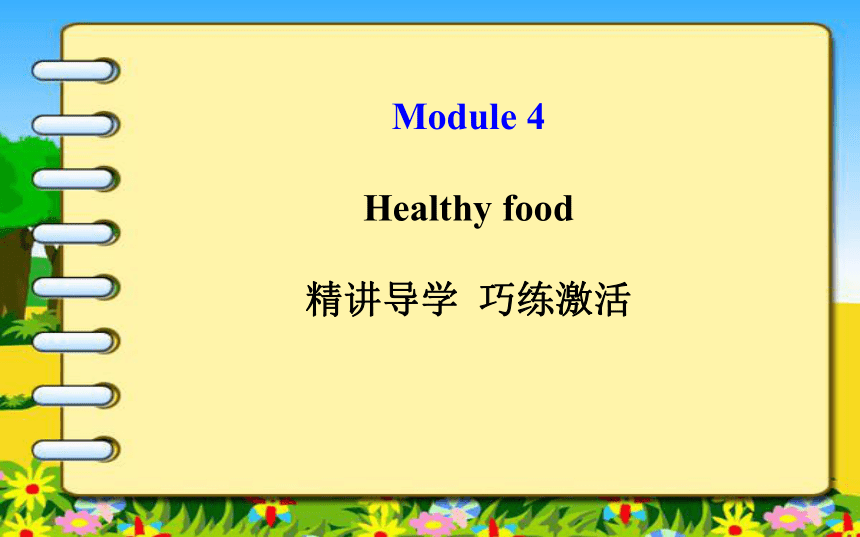 | |
| 格式 | zip | ||
| 文件大小 | 2.7MB | ||
| 资源类型 | 教案 | ||
| 版本资源 | 外研版 | ||
| 科目 | 英语 | ||
| 更新时间 | 2014-11-21 00:27:44 | ||
图片预览

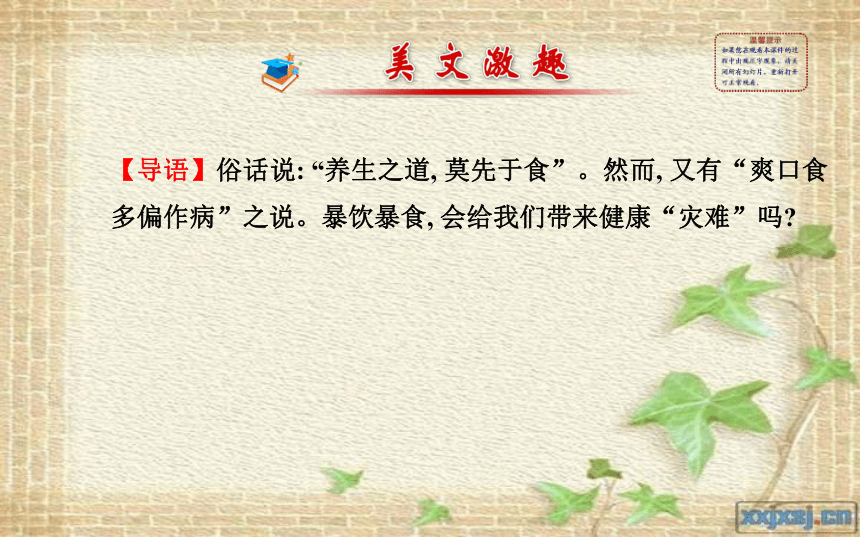
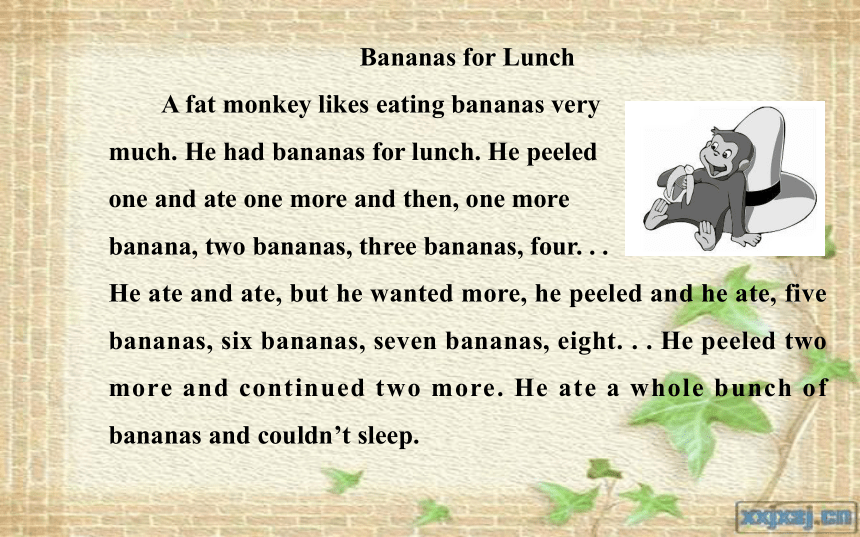
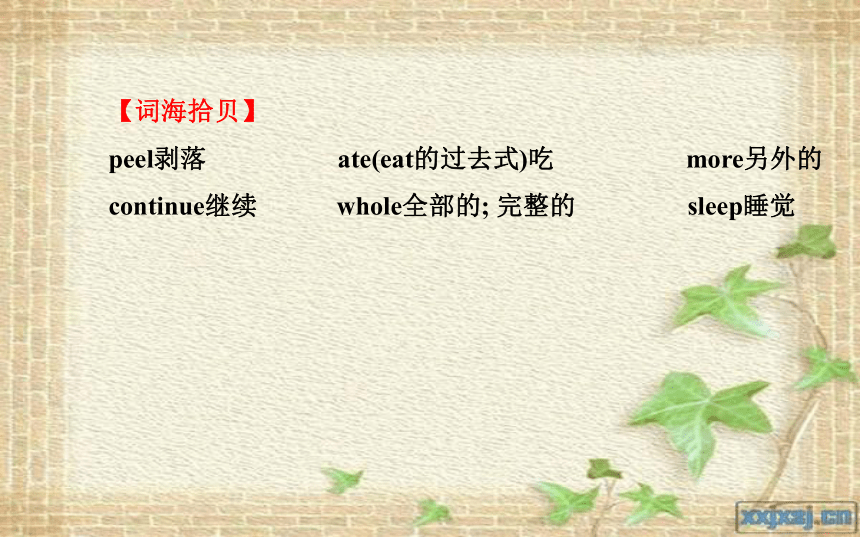
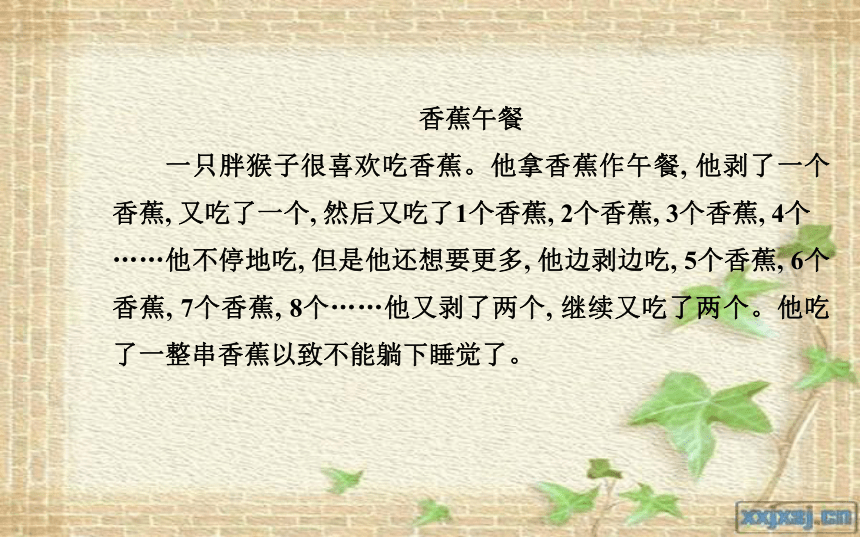
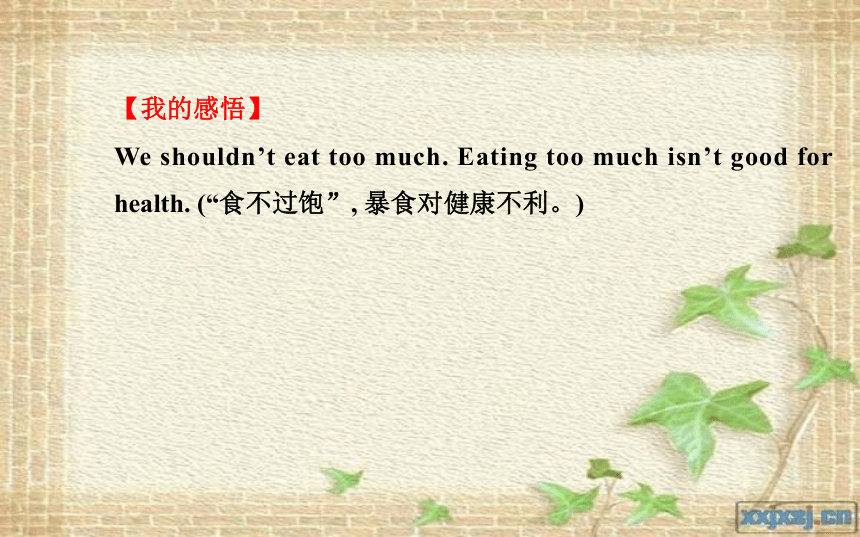
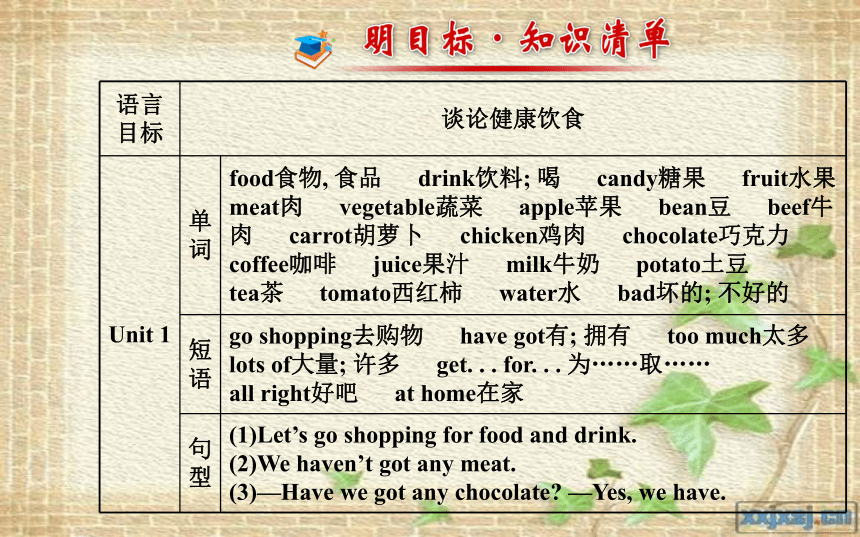
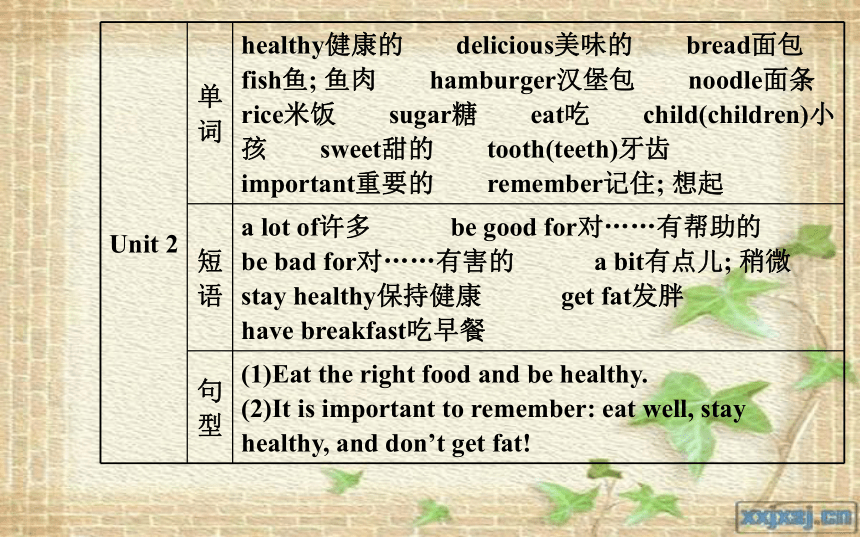
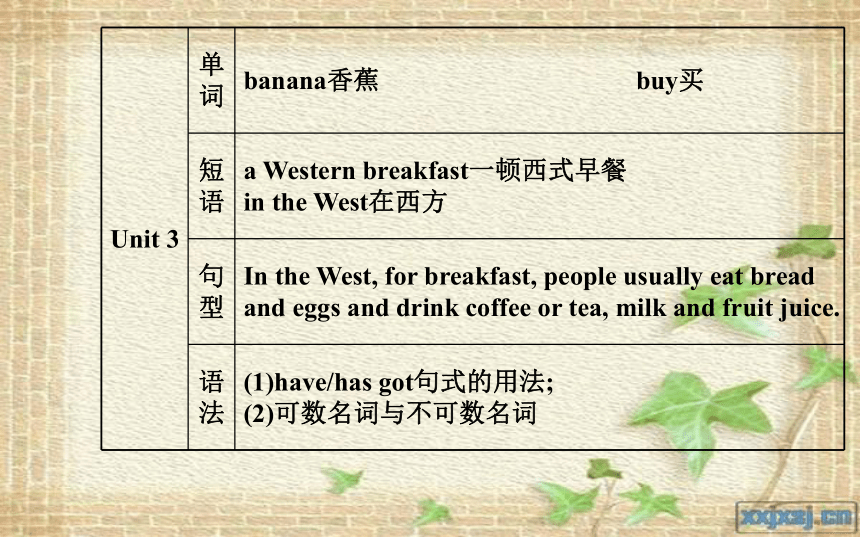
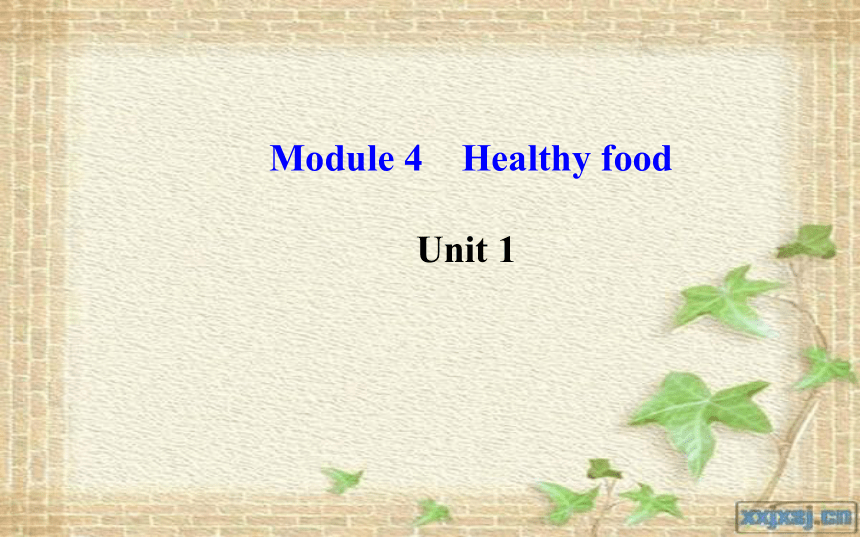
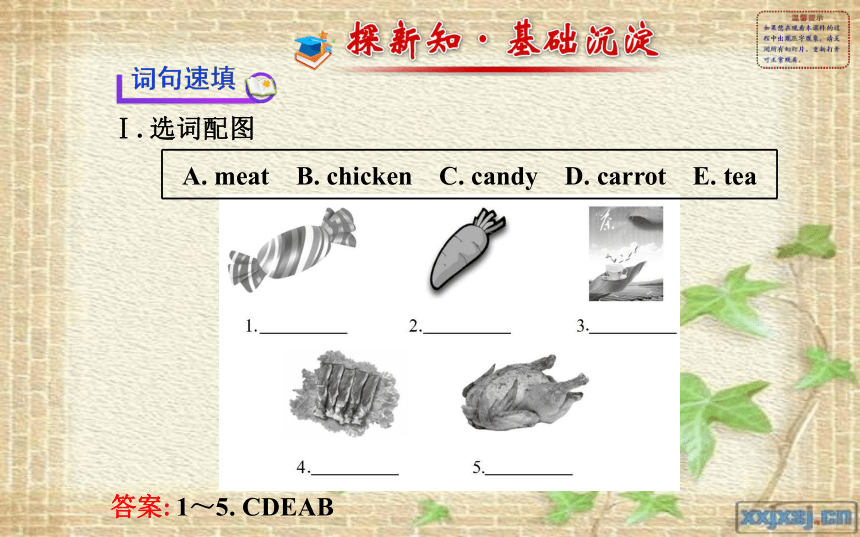
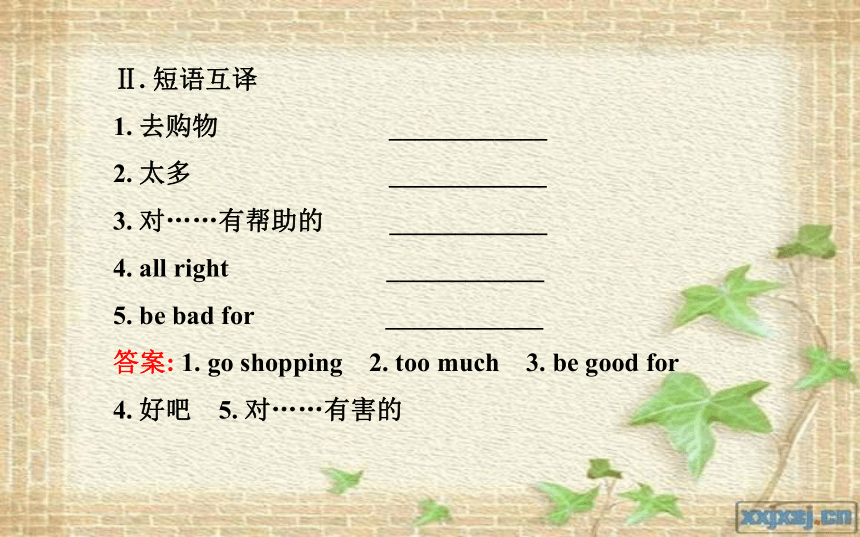
文档简介
课件98张PPT。Module 4
Healthy food
精讲导学 巧练激活
【导语】俗话说: “养生之道, 莫先于食”。然而, 又有“爽口食多偏作病”之说。暴饮暴食, 会给我们带来健康“灾难”吗? Bananas for Lunch
A fat monkey likes eating bananas very
much. He had bananas for lunch. He peeled
one and ate one more and then, one more
banana, two bananas, three bananas, four. . .
He ate and ate, but he wanted more, he peeled and he ate, five bananas, six bananas, seven bananas, eight. . . He peeled two more and continued two more. He ate a whole bunch of bananas and couldn’t sleep. 【词海拾贝】
peel剥落 ate(eat的过去式)吃 more另外的
continue继续 whole全部的; 完整的 sleep睡觉香蕉午餐
一只胖猴子很喜欢吃香蕉。他拿香蕉作午餐, 他剥了一个香蕉, 又吃了一个, 然后又吃了1个香蕉, 2个香蕉, 3个香蕉, 4个
……他不停地吃, 但是他还想要更多, 他边剥边吃, 5个香蕉, 6个香蕉, 7个香蕉, 8个……他又剥了两个, 继续又吃了两个。他吃了一整串香蕉以致不能躺下睡觉了。【我的感悟】
We shouldn’t eat too much. Eating too much isn’t good for health. (“食不过饱”, 暴食对健康不利。)Module 4 Healthy food
Unit 1? Ⅰ. 选词配图
A. meat B. chicken C. candy D. carrot E. tea
答案: 1~5. CDEABⅡ. 短语互译
1. 去购物 ____________
2. 太多 ____________
3. 对……有帮助的 ____________
4. all right ____________
5. be bad for ____________
答案: 1. go shopping 2. too much 3. be good for
4. 好吧 5. 对……有害的Ⅲ. 句型填词
1. 我们没有肉了。
We_________ __________ ___________meat.
2. ——我们有一些巧克力吗?
——是的, 我们有。
—__________we__________ __________chocolate?
—Yes, we__________.
3. 让我们买些水果吧。
_________ ___________some fruit.
答案: 1. haven’t got any 2. Have; got any; have
3. Let’s get/buy4. 什么种类的水果?
__________ __________ __________fruit?
5. ——橙汁怎么样?
——好主意!
—_________ ___________some orange juice?
—_________ ___________!
答案: 4. What kind of 5. How about; Good idea1. Now, we haven’t got any meat.
2. Let’s get some chicken.
3. Have we got any chocolate?
____________________________________________
____________________________________________
____________________________________________
答案: any用于否定句和疑问句中; 而some用于肯定句中。1. drink n. 饮料 v. 喝
【语境领悟】
*Let’s go shopping for food and drink.
我们去买食物和饮料吧。
*Tea is a popular drink in China.
在中国, 茶是一种受欢迎的饮料。
*You should drink more water.
你应该多喝水。【自主归纳】drink的两种词性【图解助记】【学以致用】
你最喜欢的饮料是什么?
What’s your favourite__________?
答案: drink【授课备选】补充练习
①There are all kinds of(各种各样)______in this shop.
A. drink B. drinks C. a drink D. drinking
【解析】选B。考查名词的用法。drink指各种各样的饮料, 是可数名词。故选B。②I ______ milk every day in the morning.
A. play B. eat C. do D. drink
【解析】选D。考查动词辨析。句意: 我每天早晨喝牛奶。play意为“玩”; eat意为“吃”; do意为“做”; drink意为“喝”。故选D。2. some adj. 若干, 一些, 少量的
pron. 一些, 某些
【语境领悟】
*Let’s get some chicken.
让我们买些鸡肉吧。
*There are some books on the desk.
在桌子上有些书。*The soup is delicious. Please give me some.
汤太美味了, 请给我一些。
*Is there any beef in the fridge?
在冰箱里有些牛肉吗?
*There isn’t any water here.
这里没有水了。【自主归纳】some与any的用法区别【温馨提示】在表示请求、邀请、建议的疑问句中常用some而不用any。例如: Could you get some apples for me? 你能给我拿些苹果吗? 【学以致用】
①(2014·福建泉州期末)—Does your aunt have______friends in Quanzhou?
—Yes. She has ______ good friends here.
A. any; any B. some; any
C. any; some
②(2013·苏州中考)—Your tea smells great!
—It’s from India. Would you like__________?
A. it B. this C. some D. little3. kind n. 种类
【语境领悟】
*What kind of fruit? 什么种类的水果?
*There are all kinds of bags in the shop.
商店里有各种各样的包。【自主归纳】
(1)kind作名词, 意为“种类; 类型”, 常与of连用, 构成a kind of表示“一种”; all kinds of表示“各种各样的”。
(2)“What kind of+复数名词/不可数名词? ”意为“哪一种……? ”, 常用来询问某物的种类或类型。【学以致用】
你喜欢哪种类型的书?
__________ ___________ __________ _________do you like?
答案: What kind of books4. too much太多
【语境领悟】
*Too much chocolate isn’t good for you.
(吃)太多巧克力, 对你(身体)不好。
*There are too many people in the hall.
大厅里有太多人。
*The house is much too big.
这栋房子太大了。【自主归纳】【巧学助记】
too much与much too, 用法区别看后头;
much后接名词不可数, too则可接形或副;
too many一定要记住, 其后名词必复数。【学以致用】
①Don’t drink __________ wine(酒). It isn’t good for you.
A. too much B. too many
C. much too D. many too
②袋子里有太多的苹果。
There are __________ __________ apples in the bag.
③这棵树太高了。
This tree is __________ __________ tall.
答案: ②too many ③much too【备选要点】
food n. 食物; 食品
【语境领悟】
*Let’s go to buy some food. 我们去买些食物吧。
*There are all kinds of foods here.
这儿有各种各样的食品。【自主归纳】
food用作名词, 意为“食物; 食品”, 是不可数名词。
当表示特定种类的食物或各种各样的食物时, 是可数名词。【学以致用】
①好的食物使你健康。
__________ __________keeps you healthy.
②这是一种美食。
This is_________ ___________ __________.
答案: ①Good food ②a delicious foodⅠ. 单项选择
1. There are many ______ in the basket.
A. potatos B. potatoes C. fruit D. food
2. Lisa often goes ______ with her mother on Saturday afternoon.
A. shop B. shops C. shopping D. shopping for
3. —Mum, I’m thirsty.
—I’ll get some water ______ you.
A. to B. on C. for D. at4. There’re no pears, Amy. Would you like to get______?
A. some B. any C. it D. one
5. —Let’s play football after school!
—_______
A. Thanks. B. Good idea.
C. Too good. D. Yes, goodbye. Ⅱ. 完成句子
1. 请不要吃太多肉。
Don’t eat __________ __________ meat, please.
2. 你喜欢什么种类的蔬菜?
_________ __________ ___________vegetables do you like?
3. 我家房子前面有许多橘子树。
There are _________ ___________ orange trees in front of my house.
答案: 1. too much 2. What kind of 3. lots of4. 你们饿了。来一些米饭好吗?
You are hungry. _________ ___________some rice?
5. 蔬菜和水果对我们有好处。
Vegetables and fruit_________ __________ ___________us.
6. 那个女孩有一本英汉词典。
That girl__________ __________an English-Chinese dictionary.
答案: 4. How/ What about 5. are good for 6. has gotModule 4 Healthy food
Unit 2 Ⅰ. 单词拼写
1. hamburger(n. ) ______________
2. sugar(n. ) ______________
3. sweet(adj. ) ______________
4. 美味的(adj. ) ______________
5. 重要的(adj. ) ______________
答案: 1. 汉堡包 2. 糖 3. 甜的 4. delicious 5. important6. 劳累的(adj. ) ______________
7. child(n. ) →__________(pl. )小孩, 儿童
8. tooth(n. ) →__________(pl. )牙齿
答案: 6. tired 7. children 8. teethⅡ. 短语互译
1. 许多 _________ ___________of
2. 保持健康 stay________
3. a bit ______________
4. get fat ______________
5. have breakfast ______________
答案: 1. a lot 2. healthy 3. 有点儿; 稍微 4. 发胖 5. 吃早餐Ⅲ. 句型填词
1. 肉是健康的, 但是太多肉对孩子不好。
Meat is healthy __________ too much meat __________ not __________ __________ children.
2. 可乐和糖果很甜, 并且太多糖对你有害。
Cola and candy are very sweet, and too much sugar __________ __________ __________ you.
答案: 1. but; is; good for 2. is bad for 3. 记住: 吃好、保持健康还有不变胖是重要的!
__________ __________ important__________ __________: eat well, stay healthy, and __________ __________ fat!
4. 你最喜爱的食物和饮料是什么?
_________ __________ ___________ food and drink?
答案: 3. It is; to remember; don’t get 4. What’s your favourite1. Are too much meat and sugar good for us?
______________________________________
2. Which(哪一种)food is good for our eyes and teeth?
_____________________________________________
3. When(何时)do we have chicken soup?
_____________________________________________
答案: 1. No, they aren’t.
2. Carrots, eggs and sweet potatoes are good for our eyes and milk, cheese and fish are good for our teeth.
3. When we are a bit tired. 4. How can we stay healthy?
_____________________________________________
答案: 4. Eat noodles or rice, not hamburgers; have a good breakfast every morning; drink juice, water, tea and milk, not cola and eat lots of fruit and vegetables. 1. or conj. 或者
【语境领悟】
*Eat noodles or rice, not hamburgers.
吃面条或米饭, 而不是汉堡包。
*He doesn’t have a television or a radio.
他没有电视机和收音机。
*Put on your coat, or you’ll catch a cold.
穿上你的外套, 否则你会感冒的。【自主归纳】【妙辨异同】but, and, or和so的区别【学以致用】
选词填空 and/or/so/but。
①The school is next to his home, __________ he walks to school every day.
②There is a lot of sour pork __________ sweet fruit.
③I’d like to watch TV, __________ I must do my homework first.
④What’s your favourite drink, tea __________ coffee?
答案: ①so ②and ③but ④or2. a bit稍微; 有点儿
【语境领悟】
*A bit tired? 有点累吗?
*Can you open the window a bit?
你能把窗户稍微打开点儿吗?
*There is a bit of water in the bottle. 瓶子里有一点水。【自主归纳】
(1)a bit意为“稍微; 有点儿”, 可以修饰形容词、动词或副词, 修饰动词时通常放在句末。
(2)a bit还可与介词of连用, 构成a bit of, 意为“一点”, 修饰不可数名词, 相当于a little。【学以致用】
我喜欢甜食, 所以有点儿胖。
I like sweet, so I am ______ ______ fat.
答案: a bit【授课备选】补充练习
碗里只有一点儿糖了。
There’s only ______ ______ ______ sugar in the bowl.
答案: a bit ofⅠ. 用所给词的适当形式填空
1. There are some__________(child)in the park.
2. Chocolate is bad for your__________(tooth).
3. It’s very important for us__________(take)some exercise every day.
4. Cola is not a__________(health)drink. I don’t drink it.
5. My favourite food is__________(noodle).
答案: 1. children 2. teeth 3. to take 4. healthy
5. noodlesⅡ. 完成句子
1. 他最喜爱的水果是什么?
__________ __________ __________fruit?
2. 为了保持健康, 我每天都锻炼。
To__________ __________, I take exercise every day.
3. 看太多电视对你不好。
Watching too much TV isn’t __________ __________ you.
答案: 1. What’s his favourite 2. stay healthy
3. good for4. 海伦不想在暑假变胖。
Helen doesn’t want to _________ ___________ during summer holiday.
5. 听到这个消息后, 这位老人看起来有点悲伤。
After hearing the news, the old man looks __________ __________ sad.
答案: 4. get fat 5. a bitModule 4 Healthy food
Unit 3buy v. 买
【语境领悟】
*Remember to buy some fruit.
记得买一些水果。
*Mum buys me English books.
妈妈给我买英文书。【自主归纳】
(1)buy作动词, 表示“买”。可接双宾语, 即buy sb. sth. “为某人买某物”。
(2)固定搭配buy sb. sth. =buy sth. for sb. 。例如: My father often buys me books. = My father often buys books for me.
我爸爸经常给我买书。【学以致用】
①我们去给妈妈买些香蕉吧。
Let’s __________ some bananas __________ mum.
②My father buys me a new bike. (改为同义句)
My father __________ a new bike __________ me.
答案: ①buy; for ②buys; for一、have/has got句式的用法
【语境领悟】
仔细观察下列例句, 体会不同句式中have / has got的用法。
①We have got lots of apples.
②We haven’t got any meat.
③She hasn’t got any coffee.
④—Have we got any chocolate?
—Yes, we have. 【知识构建】
1. 结构及用法。“主语+have/has got+其他”表示“某人有……”。当主语为第一、二人称或第三人称复数时, 用have got; 当主语为第三人称单数时, 用has got。
2. have/has got表示“有”的三种句式。
(1)肯定句式: 主语+ have/has got+其他
(2)否定句式: 主语+ have/has+not+got+其他
(have not可以缩写为: haven’t; has not可以缩写为hasn’t)
(3)疑问句式: Have/Has+主语+got+其他?
肯定回答: Yes, 主语+have/has.
否定回答: No, 主语+haven’t/hasn’t. 【温馨提示】
have got与have同义; has got与has同义。但是, 其句式有所区别。【学以致用】句型转换
1. We have got some beans in the bowl. (改为一般疑问句)
__________you __________ any beans in the bowl?
2. My father has got a white car. (改为否定句)
My father __________ __________ a white car.
3. Have you got any bread? (作否定回答)
No, __________ __________.
答案: 1. Have; got 2. hasn’t got 3. I/we haven’t4. Has Sally got an ice cream? (作肯定回答)
Yes, __________ __________.
5. They have got much money in the bank. (对画线部分提问)
__________ __________they __________ in the bank?
答案: 4. she has 5. What have; got完成句子
1. 我有一辆新自行车。
I __________ __________ a new bike.
2. 大明没有电脑。
Daming __________ __________ a computer.
3. ——他们有许多苹果吗?
—__________they __________ many apples?
——是的, 他们有。
—__________, __________ __________.
答案: 1. have got 2. hasn’t got / doesn’t have
3. Have; got; Yes; they have/ Do; have; Yes; they do4. ——李明有一个姐姐吗?
——不, 他没有。
—__________Li Ming __________ a sister?
—__________, __________ __________.
答案: Has; got; No; he hasn’t/ Does; have; No, he doesn’t二、可数名词和不可数名词
【语境领悟】
仔细观察例句, 体会名词变复数的规则。
①Eat a lot of vegetables.
②I have two boxes of chocolates.
③There are many factories in our town.
④Do you like eating potatoes?
⑤I have five knives. 【知识构建】
(一)定义:
名词是表示人、物、地点、情感或抽象概念的词。可分为可数名词和不可数名词。
(二)可数名词的复数与不可数名词的量
1. 可数名词的复数形式的构成。(1)规则变化: (2)不规则变化:
①改变单数名词中的元音字母或其他形式, 如man—men, tooth—teeth, mouse—mice, child—children。
②单复数形式相同, 如sheep, deer, fish等, 以及由汉语音译表示度量、币制等单位的名词, 如yuan。另外以-ese或-ss结尾的表示民族的名词也一样同形, 如Chinese等。2. 不可数名词的量。
(1)数词+容器(单位词)+of+不可数名词(数词大于1时, 单位词用可数名词复数形式)。例如: two cups of tea两杯茶。
(2)经常用some, any, much, a lot of, lots of, a little, a bit of等词或短语修饰。例如: lots of bread许多面包。【巧学助记】名词单数变复数口诀
名词单数变复数, 直接加-s占多数;
s, x, ch, sh来结尾, 直接加上-es;
词尾是f或fe, 加-s之前先变ve;
辅音+ y在词尾, 把y变i再加-es;
词尾字母若是o, 常用三个已足够;
要加-es请记好, hero, tomato, potato。【学以致用】
将下列名词变成复数形式。
1. apple__________ 2. carrot_________
3. box__________ 4. class_________
5. photo__________ 6. tomato_________
7. city__________ 8. knife_________
9. child__________ 10. Chinese_________
答案: 1. apples 2. carrots 3. boxes 4. classes 5. photos
6. tomatoes 7. cities 8. knives 9. children 10. Chinese 学生的健康状况已引起全社会的关注, 很多学生喜欢吃不健康的食品。作为学校广播站的广播员, 请你写一篇英语短文, 倡议大家不要吃垃圾食品。
要求: 1. 词数为60个左右;
2. 字迹工整, 表达正确, 无语法错误。【思路点拨】
(1)体裁: 议论文。
(2)人称: 第一人称和第三人称。
(3)时态: 一般现在时。【写作模板】【佳作鉴赏】
Dear girls and boys,
It’s important for us to stay healthy. But many students’favourite is hamburgers, ice cream and cola. They are unhealthy. They are bad for our health. If we want to stay healthy, we should refuse unhealthy food and drink. We should eat healthy food first. We should eat lots of fruit and vegetables. They are healthy and good for us.
Girls and boys, for our health, don’t eat unhealthy food. Thanks for listening. Ⅰ. 选词填空
some, any, or, in, a bit
1. Tom is __________ hungry, so he eats a hamburger.
2. The old woman hasn’t got __________ teeth.
3. __________the West, people like having afternoon tea every day.
4. There are __________ apple trees in the park.
5. Don’t eat candy __________ ice cream. They’re bad for your health.
答案: 1. a bit 2. any 3. In 4. some 5. orⅡ. 单项选择
1. Remember __________ healthy food, please.
A. to eat B. eating C. eats D. eat
2. It’s nice of you __________ the door for me.
A. opening B. to open
C. open D. opens
3. —Have you got any chicken?
—__________. I want to buy some.
A. Yes, I have B. Yes, you have
C. No, I haven’t D. No, you haven’t4. What do people have __________ breakfast in your country?
A. to B. for
C. in D. on
5. John buys some flowers __________ his mother.
A. with B. to
C. from D. for模块复习课
Module 4Ⅰ. 词汇速记
1. 蔬菜(n. ) ______________
2. 鸡肉(n. ) ______________
3. 土豆(n. ) ______________
4. 美味的(adj. ) ______________
5. 重要的(adj. ) ______________
答案: 1. vegetable 2. chicken 3. potato 4. delicious
5. important 6. health(n. ) →__________(adj. )健康的
→__________(反义词)不健康的
7. child(n. ) →__________(复数)小孩; 儿童
8. tooth(n. ) →__________(复数)牙齿
9. have( v. ) →__________(第三人称单数形式)有
答案: 6. healthy; unhealthy 7. children 8. teeth 9. hasⅡ. 短语互译
1. 去购物 go__________
2. 对……有帮助的 be_________ _________
3. 大量, 许多 __________of
4. 有点儿累 _________ ___________tired
5. too much ________________
6. be bad for ________________
7. remember to do sth. ________________
8. get sth. for sb. ________________
答案: 1. shopping 2. good for 3. lots 4. a bit 5. 太多
6. 对……有害的 7. 记得做某事 8. 为某人去拿某物Ⅲ. 句型攻关
1. 你喜欢哪种类型的小说?
___________ __________ _________novels do you like?
2. 每天吃一些水果和蔬菜是很重要的。
__________very important__________ __________some fruit and vegetables every day.
答案: 1. What kind of 2. It’s; to eat3. ——一杯咖啡怎么样?
—__________ __________a cup of coffee?
——好主意。
—__________ __________.
答案: What / How about; Good idea4. 我们有一些蔬菜, 但是没有肉和饮料, 所以我们去买一些吧。
We __________ __________ some vegetables, __________ we __________ __________ any meat __________ drink, __________ let’s __________ some.
5. ——你们有鸡蛋吗?
—__________ you __________any eggs?
——不, 我们没有。
—No, we__________.
答案: 4. have got; but; haven’t got; or; so; buy
5. Have; got; haven’tⅣ. 语法专练
(Ⅰ)根据句意, 用have got或there be的适当形式填空。
1. I __________ __________ a computer.
2. —__________ you __________a nice cat?
—Yes, I have.
3. __________three people in Sally’s family. Sally _________ ___________ any brothers or sisters. She is the only child in the family.
答案: 1. have got 2. Have; got 3. There’re; hasn’t got4. The girl __________ __________ (not) a tomato, but she __________ a potato.
5. —__________ __________a big tree behind your house?
—No, _________ ___________.
答案: 4. hasn’t got; has got 5. Is there; there isn’t(Ⅱ)完成句子。
1. 我有三个香蕉。
I __________ __________ three bananas.
2. 托尼有一辆新自行车。
Tony __________ __________ a new bike.
3. 他们教室里没有电脑。
They __________ __________ any computers in the classroom.
4. 她房间里有电视吗?
__________ she __________ a television in her room?
答案: 1. have got 2. has got 3. haven’t got
4. Has; got(Ⅲ)选词填空。
some, any
1. There are __________ apples in the basket.
2. We haven’t got __________ computers in the room.
3. Are there __________ English books on the desk?
4. —May I ask you __________ questions?
—Of course.
5. You can ask __________ student for help in our class.
答案: 1. some 2. any 3. any 4. some 5. any(Ⅳ)将下列名词变为复数形式。
1. orange________ 2. bus________
3. hero________ 4. watch________
5. family________ 6. Chinese________
7. wife________ 8. radio________
9. woman________ 10. foot________
答案: 1. oranges 2. buses 3. heroes 4. watches 5. families
6. Chinese 7. wives 8. radios 9. women 10. feetⅤ. 词汇串记
1 (汉堡包), candy and 2 (冰激凌)aren’t healthy
food, so we can’t eat them 3 4 (太多). Cola is not a 5 (健康的)drink, so we can’t drink it a lot. Vegetables, meat and 6 (水果)are healthy food. Milk, water and juice are healthy drinks. To be healthy, we should eat vegetables, like 7 (土豆)and 8 (胡萝卜). We should eat meat, like 9 (鸡肉)and 10 (牛肉). We should drink juice, water and milk. 1. ______ 2. ______ 3. ______ 4. ______ 5. ____
6. ______ 7. ______ 8. ______ 9. ______ 10. ____
答案: 1. Hamburgers 2. ice-cream 3. too 4. much
5. healthy 6. fruit 7. potatoes 8. carrots
9. chicken 10. beef
Healthy food
精讲导学 巧练激活
【导语】俗话说: “养生之道, 莫先于食”。然而, 又有“爽口食多偏作病”之说。暴饮暴食, 会给我们带来健康“灾难”吗? Bananas for Lunch
A fat monkey likes eating bananas very
much. He had bananas for lunch. He peeled
one and ate one more and then, one more
banana, two bananas, three bananas, four. . .
He ate and ate, but he wanted more, he peeled and he ate, five bananas, six bananas, seven bananas, eight. . . He peeled two more and continued two more. He ate a whole bunch of bananas and couldn’t sleep. 【词海拾贝】
peel剥落 ate(eat的过去式)吃 more另外的
continue继续 whole全部的; 完整的 sleep睡觉香蕉午餐
一只胖猴子很喜欢吃香蕉。他拿香蕉作午餐, 他剥了一个香蕉, 又吃了一个, 然后又吃了1个香蕉, 2个香蕉, 3个香蕉, 4个
……他不停地吃, 但是他还想要更多, 他边剥边吃, 5个香蕉, 6个香蕉, 7个香蕉, 8个……他又剥了两个, 继续又吃了两个。他吃了一整串香蕉以致不能躺下睡觉了。【我的感悟】
We shouldn’t eat too much. Eating too much isn’t good for health. (“食不过饱”, 暴食对健康不利。)Module 4 Healthy food
Unit 1? Ⅰ. 选词配图
A. meat B. chicken C. candy D. carrot E. tea
答案: 1~5. CDEABⅡ. 短语互译
1. 去购物 ____________
2. 太多 ____________
3. 对……有帮助的 ____________
4. all right ____________
5. be bad for ____________
答案: 1. go shopping 2. too much 3. be good for
4. 好吧 5. 对……有害的Ⅲ. 句型填词
1. 我们没有肉了。
We_________ __________ ___________meat.
2. ——我们有一些巧克力吗?
——是的, 我们有。
—__________we__________ __________chocolate?
—Yes, we__________.
3. 让我们买些水果吧。
_________ ___________some fruit.
答案: 1. haven’t got any 2. Have; got any; have
3. Let’s get/buy4. 什么种类的水果?
__________ __________ __________fruit?
5. ——橙汁怎么样?
——好主意!
—_________ ___________some orange juice?
—_________ ___________!
答案: 4. What kind of 5. How about; Good idea1. Now, we haven’t got any meat.
2. Let’s get some chicken.
3. Have we got any chocolate?
____________________________________________
____________________________________________
____________________________________________
答案: any用于否定句和疑问句中; 而some用于肯定句中。1. drink n. 饮料 v. 喝
【语境领悟】
*Let’s go shopping for food and drink.
我们去买食物和饮料吧。
*Tea is a popular drink in China.
在中国, 茶是一种受欢迎的饮料。
*You should drink more water.
你应该多喝水。【自主归纳】drink的两种词性【图解助记】【学以致用】
你最喜欢的饮料是什么?
What’s your favourite__________?
答案: drink【授课备选】补充练习
①There are all kinds of(各种各样)______in this shop.
A. drink B. drinks C. a drink D. drinking
【解析】选B。考查名词的用法。drink指各种各样的饮料, 是可数名词。故选B。②I ______ milk every day in the morning.
A. play B. eat C. do D. drink
【解析】选D。考查动词辨析。句意: 我每天早晨喝牛奶。play意为“玩”; eat意为“吃”; do意为“做”; drink意为“喝”。故选D。2. some adj. 若干, 一些, 少量的
pron. 一些, 某些
【语境领悟】
*Let’s get some chicken.
让我们买些鸡肉吧。
*There are some books on the desk.
在桌子上有些书。*The soup is delicious. Please give me some.
汤太美味了, 请给我一些。
*Is there any beef in the fridge?
在冰箱里有些牛肉吗?
*There isn’t any water here.
这里没有水了。【自主归纳】some与any的用法区别【温馨提示】在表示请求、邀请、建议的疑问句中常用some而不用any。例如: Could you get some apples for me? 你能给我拿些苹果吗? 【学以致用】
①(2014·福建泉州期末)—Does your aunt have______friends in Quanzhou?
—Yes. She has ______ good friends here.
A. any; any B. some; any
C. any; some
②(2013·苏州中考)—Your tea smells great!
—It’s from India. Would you like__________?
A. it B. this C. some D. little3. kind n. 种类
【语境领悟】
*What kind of fruit? 什么种类的水果?
*There are all kinds of bags in the shop.
商店里有各种各样的包。【自主归纳】
(1)kind作名词, 意为“种类; 类型”, 常与of连用, 构成a kind of表示“一种”; all kinds of表示“各种各样的”。
(2)“What kind of+复数名词/不可数名词? ”意为“哪一种……? ”, 常用来询问某物的种类或类型。【学以致用】
你喜欢哪种类型的书?
__________ ___________ __________ _________do you like?
答案: What kind of books4. too much太多
【语境领悟】
*Too much chocolate isn’t good for you.
(吃)太多巧克力, 对你(身体)不好。
*There are too many people in the hall.
大厅里有太多人。
*The house is much too big.
这栋房子太大了。【自主归纳】【巧学助记】
too much与much too, 用法区别看后头;
much后接名词不可数, too则可接形或副;
too many一定要记住, 其后名词必复数。【学以致用】
①Don’t drink __________ wine(酒). It isn’t good for you.
A. too much B. too many
C. much too D. many too
②袋子里有太多的苹果。
There are __________ __________ apples in the bag.
③这棵树太高了。
This tree is __________ __________ tall.
答案: ②too many ③much too【备选要点】
food n. 食物; 食品
【语境领悟】
*Let’s go to buy some food. 我们去买些食物吧。
*There are all kinds of foods here.
这儿有各种各样的食品。【自主归纳】
food用作名词, 意为“食物; 食品”, 是不可数名词。
当表示特定种类的食物或各种各样的食物时, 是可数名词。【学以致用】
①好的食物使你健康。
__________ __________keeps you healthy.
②这是一种美食。
This is_________ ___________ __________.
答案: ①Good food ②a delicious foodⅠ. 单项选择
1. There are many ______ in the basket.
A. potatos B. potatoes C. fruit D. food
2. Lisa often goes ______ with her mother on Saturday afternoon.
A. shop B. shops C. shopping D. shopping for
3. —Mum, I’m thirsty.
—I’ll get some water ______ you.
A. to B. on C. for D. at4. There’re no pears, Amy. Would you like to get______?
A. some B. any C. it D. one
5. —Let’s play football after school!
—_______
A. Thanks. B. Good idea.
C. Too good. D. Yes, goodbye. Ⅱ. 完成句子
1. 请不要吃太多肉。
Don’t eat __________ __________ meat, please.
2. 你喜欢什么种类的蔬菜?
_________ __________ ___________vegetables do you like?
3. 我家房子前面有许多橘子树。
There are _________ ___________ orange trees in front of my house.
答案: 1. too much 2. What kind of 3. lots of4. 你们饿了。来一些米饭好吗?
You are hungry. _________ ___________some rice?
5. 蔬菜和水果对我们有好处。
Vegetables and fruit_________ __________ ___________us.
6. 那个女孩有一本英汉词典。
That girl__________ __________an English-Chinese dictionary.
答案: 4. How/ What about 5. are good for 6. has gotModule 4 Healthy food
Unit 2 Ⅰ. 单词拼写
1. hamburger(n. ) ______________
2. sugar(n. ) ______________
3. sweet(adj. ) ______________
4. 美味的(adj. ) ______________
5. 重要的(adj. ) ______________
答案: 1. 汉堡包 2. 糖 3. 甜的 4. delicious 5. important6. 劳累的(adj. ) ______________
7. child(n. ) →__________(pl. )小孩, 儿童
8. tooth(n. ) →__________(pl. )牙齿
答案: 6. tired 7. children 8. teethⅡ. 短语互译
1. 许多 _________ ___________of
2. 保持健康 stay________
3. a bit ______________
4. get fat ______________
5. have breakfast ______________
答案: 1. a lot 2. healthy 3. 有点儿; 稍微 4. 发胖 5. 吃早餐Ⅲ. 句型填词
1. 肉是健康的, 但是太多肉对孩子不好。
Meat is healthy __________ too much meat __________ not __________ __________ children.
2. 可乐和糖果很甜, 并且太多糖对你有害。
Cola and candy are very sweet, and too much sugar __________ __________ __________ you.
答案: 1. but; is; good for 2. is bad for 3. 记住: 吃好、保持健康还有不变胖是重要的!
__________ __________ important__________ __________: eat well, stay healthy, and __________ __________ fat!
4. 你最喜爱的食物和饮料是什么?
_________ __________ ___________ food and drink?
答案: 3. It is; to remember; don’t get 4. What’s your favourite1. Are too much meat and sugar good for us?
______________________________________
2. Which(哪一种)food is good for our eyes and teeth?
_____________________________________________
3. When(何时)do we have chicken soup?
_____________________________________________
答案: 1. No, they aren’t.
2. Carrots, eggs and sweet potatoes are good for our eyes and milk, cheese and fish are good for our teeth.
3. When we are a bit tired. 4. How can we stay healthy?
_____________________________________________
答案: 4. Eat noodles or rice, not hamburgers; have a good breakfast every morning; drink juice, water, tea and milk, not cola and eat lots of fruit and vegetables. 1. or conj. 或者
【语境领悟】
*Eat noodles or rice, not hamburgers.
吃面条或米饭, 而不是汉堡包。
*He doesn’t have a television or a radio.
他没有电视机和收音机。
*Put on your coat, or you’ll catch a cold.
穿上你的外套, 否则你会感冒的。【自主归纳】【妙辨异同】but, and, or和so的区别【学以致用】
选词填空 and/or/so/but。
①The school is next to his home, __________ he walks to school every day.
②There is a lot of sour pork __________ sweet fruit.
③I’d like to watch TV, __________ I must do my homework first.
④What’s your favourite drink, tea __________ coffee?
答案: ①so ②and ③but ④or2. a bit稍微; 有点儿
【语境领悟】
*A bit tired? 有点累吗?
*Can you open the window a bit?
你能把窗户稍微打开点儿吗?
*There is a bit of water in the bottle. 瓶子里有一点水。【自主归纳】
(1)a bit意为“稍微; 有点儿”, 可以修饰形容词、动词或副词, 修饰动词时通常放在句末。
(2)a bit还可与介词of连用, 构成a bit of, 意为“一点”, 修饰不可数名词, 相当于a little。【学以致用】
我喜欢甜食, 所以有点儿胖。
I like sweet, so I am ______ ______ fat.
答案: a bit【授课备选】补充练习
碗里只有一点儿糖了。
There’s only ______ ______ ______ sugar in the bowl.
答案: a bit ofⅠ. 用所给词的适当形式填空
1. There are some__________(child)in the park.
2. Chocolate is bad for your__________(tooth).
3. It’s very important for us__________(take)some exercise every day.
4. Cola is not a__________(health)drink. I don’t drink it.
5. My favourite food is__________(noodle).
答案: 1. children 2. teeth 3. to take 4. healthy
5. noodlesⅡ. 完成句子
1. 他最喜爱的水果是什么?
__________ __________ __________fruit?
2. 为了保持健康, 我每天都锻炼。
To__________ __________, I take exercise every day.
3. 看太多电视对你不好。
Watching too much TV isn’t __________ __________ you.
答案: 1. What’s his favourite 2. stay healthy
3. good for4. 海伦不想在暑假变胖。
Helen doesn’t want to _________ ___________ during summer holiday.
5. 听到这个消息后, 这位老人看起来有点悲伤。
After hearing the news, the old man looks __________ __________ sad.
答案: 4. get fat 5. a bitModule 4 Healthy food
Unit 3buy v. 买
【语境领悟】
*Remember to buy some fruit.
记得买一些水果。
*Mum buys me English books.
妈妈给我买英文书。【自主归纳】
(1)buy作动词, 表示“买”。可接双宾语, 即buy sb. sth. “为某人买某物”。
(2)固定搭配buy sb. sth. =buy sth. for sb. 。例如: My father often buys me books. = My father often buys books for me.
我爸爸经常给我买书。【学以致用】
①我们去给妈妈买些香蕉吧。
Let’s __________ some bananas __________ mum.
②My father buys me a new bike. (改为同义句)
My father __________ a new bike __________ me.
答案: ①buy; for ②buys; for一、have/has got句式的用法
【语境领悟】
仔细观察下列例句, 体会不同句式中have / has got的用法。
①We have got lots of apples.
②We haven’t got any meat.
③She hasn’t got any coffee.
④—Have we got any chocolate?
—Yes, we have. 【知识构建】
1. 结构及用法。“主语+have/has got+其他”表示“某人有……”。当主语为第一、二人称或第三人称复数时, 用have got; 当主语为第三人称单数时, 用has got。
2. have/has got表示“有”的三种句式。
(1)肯定句式: 主语+ have/has got+其他
(2)否定句式: 主语+ have/has+not+got+其他
(have not可以缩写为: haven’t; has not可以缩写为hasn’t)
(3)疑问句式: Have/Has+主语+got+其他?
肯定回答: Yes, 主语+have/has.
否定回答: No, 主语+haven’t/hasn’t. 【温馨提示】
have got与have同义; has got与has同义。但是, 其句式有所区别。【学以致用】句型转换
1. We have got some beans in the bowl. (改为一般疑问句)
__________you __________ any beans in the bowl?
2. My father has got a white car. (改为否定句)
My father __________ __________ a white car.
3. Have you got any bread? (作否定回答)
No, __________ __________.
答案: 1. Have; got 2. hasn’t got 3. I/we haven’t4. Has Sally got an ice cream? (作肯定回答)
Yes, __________ __________.
5. They have got much money in the bank. (对画线部分提问)
__________ __________they __________ in the bank?
答案: 4. she has 5. What have; got完成句子
1. 我有一辆新自行车。
I __________ __________ a new bike.
2. 大明没有电脑。
Daming __________ __________ a computer.
3. ——他们有许多苹果吗?
—__________they __________ many apples?
——是的, 他们有。
—__________, __________ __________.
答案: 1. have got 2. hasn’t got / doesn’t have
3. Have; got; Yes; they have/ Do; have; Yes; they do4. ——李明有一个姐姐吗?
——不, 他没有。
—__________Li Ming __________ a sister?
—__________, __________ __________.
答案: Has; got; No; he hasn’t/ Does; have; No, he doesn’t二、可数名词和不可数名词
【语境领悟】
仔细观察例句, 体会名词变复数的规则。
①Eat a lot of vegetables.
②I have two boxes of chocolates.
③There are many factories in our town.
④Do you like eating potatoes?
⑤I have five knives. 【知识构建】
(一)定义:
名词是表示人、物、地点、情感或抽象概念的词。可分为可数名词和不可数名词。
(二)可数名词的复数与不可数名词的量
1. 可数名词的复数形式的构成。(1)规则变化: (2)不规则变化:
①改变单数名词中的元音字母或其他形式, 如man—men, tooth—teeth, mouse—mice, child—children。
②单复数形式相同, 如sheep, deer, fish等, 以及由汉语音译表示度量、币制等单位的名词, 如yuan。另外以-ese或-ss结尾的表示民族的名词也一样同形, 如Chinese等。2. 不可数名词的量。
(1)数词+容器(单位词)+of+不可数名词(数词大于1时, 单位词用可数名词复数形式)。例如: two cups of tea两杯茶。
(2)经常用some, any, much, a lot of, lots of, a little, a bit of等词或短语修饰。例如: lots of bread许多面包。【巧学助记】名词单数变复数口诀
名词单数变复数, 直接加-s占多数;
s, x, ch, sh来结尾, 直接加上-es;
词尾是f或fe, 加-s之前先变ve;
辅音+ y在词尾, 把y变i再加-es;
词尾字母若是o, 常用三个已足够;
要加-es请记好, hero, tomato, potato。【学以致用】
将下列名词变成复数形式。
1. apple__________ 2. carrot_________
3. box__________ 4. class_________
5. photo__________ 6. tomato_________
7. city__________ 8. knife_________
9. child__________ 10. Chinese_________
答案: 1. apples 2. carrots 3. boxes 4. classes 5. photos
6. tomatoes 7. cities 8. knives 9. children 10. Chinese 学生的健康状况已引起全社会的关注, 很多学生喜欢吃不健康的食品。作为学校广播站的广播员, 请你写一篇英语短文, 倡议大家不要吃垃圾食品。
要求: 1. 词数为60个左右;
2. 字迹工整, 表达正确, 无语法错误。【思路点拨】
(1)体裁: 议论文。
(2)人称: 第一人称和第三人称。
(3)时态: 一般现在时。【写作模板】【佳作鉴赏】
Dear girls and boys,
It’s important for us to stay healthy. But many students’favourite is hamburgers, ice cream and cola. They are unhealthy. They are bad for our health. If we want to stay healthy, we should refuse unhealthy food and drink. We should eat healthy food first. We should eat lots of fruit and vegetables. They are healthy and good for us.
Girls and boys, for our health, don’t eat unhealthy food. Thanks for listening. Ⅰ. 选词填空
some, any, or, in, a bit
1. Tom is __________ hungry, so he eats a hamburger.
2. The old woman hasn’t got __________ teeth.
3. __________the West, people like having afternoon tea every day.
4. There are __________ apple trees in the park.
5. Don’t eat candy __________ ice cream. They’re bad for your health.
答案: 1. a bit 2. any 3. In 4. some 5. orⅡ. 单项选择
1. Remember __________ healthy food, please.
A. to eat B. eating C. eats D. eat
2. It’s nice of you __________ the door for me.
A. opening B. to open
C. open D. opens
3. —Have you got any chicken?
—__________. I want to buy some.
A. Yes, I have B. Yes, you have
C. No, I haven’t D. No, you haven’t4. What do people have __________ breakfast in your country?
A. to B. for
C. in D. on
5. John buys some flowers __________ his mother.
A. with B. to
C. from D. for模块复习课
Module 4Ⅰ. 词汇速记
1. 蔬菜(n. ) ______________
2. 鸡肉(n. ) ______________
3. 土豆(n. ) ______________
4. 美味的(adj. ) ______________
5. 重要的(adj. ) ______________
答案: 1. vegetable 2. chicken 3. potato 4. delicious
5. important 6. health(n. ) →__________(adj. )健康的
→__________(反义词)不健康的
7. child(n. ) →__________(复数)小孩; 儿童
8. tooth(n. ) →__________(复数)牙齿
9. have( v. ) →__________(第三人称单数形式)有
答案: 6. healthy; unhealthy 7. children 8. teeth 9. hasⅡ. 短语互译
1. 去购物 go__________
2. 对……有帮助的 be_________ _________
3. 大量, 许多 __________of
4. 有点儿累 _________ ___________tired
5. too much ________________
6. be bad for ________________
7. remember to do sth. ________________
8. get sth. for sb. ________________
答案: 1. shopping 2. good for 3. lots 4. a bit 5. 太多
6. 对……有害的 7. 记得做某事 8. 为某人去拿某物Ⅲ. 句型攻关
1. 你喜欢哪种类型的小说?
___________ __________ _________novels do you like?
2. 每天吃一些水果和蔬菜是很重要的。
__________very important__________ __________some fruit and vegetables every day.
答案: 1. What kind of 2. It’s; to eat3. ——一杯咖啡怎么样?
—__________ __________a cup of coffee?
——好主意。
—__________ __________.
答案: What / How about; Good idea4. 我们有一些蔬菜, 但是没有肉和饮料, 所以我们去买一些吧。
We __________ __________ some vegetables, __________ we __________ __________ any meat __________ drink, __________ let’s __________ some.
5. ——你们有鸡蛋吗?
—__________ you __________any eggs?
——不, 我们没有。
—No, we__________.
答案: 4. have got; but; haven’t got; or; so; buy
5. Have; got; haven’tⅣ. 语法专练
(Ⅰ)根据句意, 用have got或there be的适当形式填空。
1. I __________ __________ a computer.
2. —__________ you __________a nice cat?
—Yes, I have.
3. __________three people in Sally’s family. Sally _________ ___________ any brothers or sisters. She is the only child in the family.
答案: 1. have got 2. Have; got 3. There’re; hasn’t got4. The girl __________ __________ (not) a tomato, but she __________ a potato.
5. —__________ __________a big tree behind your house?
—No, _________ ___________.
答案: 4. hasn’t got; has got 5. Is there; there isn’t(Ⅱ)完成句子。
1. 我有三个香蕉。
I __________ __________ three bananas.
2. 托尼有一辆新自行车。
Tony __________ __________ a new bike.
3. 他们教室里没有电脑。
They __________ __________ any computers in the classroom.
4. 她房间里有电视吗?
__________ she __________ a television in her room?
答案: 1. have got 2. has got 3. haven’t got
4. Has; got(Ⅲ)选词填空。
some, any
1. There are __________ apples in the basket.
2. We haven’t got __________ computers in the room.
3. Are there __________ English books on the desk?
4. —May I ask you __________ questions?
—Of course.
5. You can ask __________ student for help in our class.
答案: 1. some 2. any 3. any 4. some 5. any(Ⅳ)将下列名词变为复数形式。
1. orange________ 2. bus________
3. hero________ 4. watch________
5. family________ 6. Chinese________
7. wife________ 8. radio________
9. woman________ 10. foot________
答案: 1. oranges 2. buses 3. heroes 4. watches 5. families
6. Chinese 7. wives 8. radios 9. women 10. feetⅤ. 词汇串记
1 (汉堡包), candy and 2 (冰激凌)aren’t healthy
food, so we can’t eat them 3 4 (太多). Cola is not a 5 (健康的)drink, so we can’t drink it a lot. Vegetables, meat and 6 (水果)are healthy food. Milk, water and juice are healthy drinks. To be healthy, we should eat vegetables, like 7 (土豆)and 8 (胡萝卜). We should eat meat, like 9 (鸡肉)and 10 (牛肉). We should drink juice, water and milk. 1. ______ 2. ______ 3. ______ 4. ______ 5. ____
6. ______ 7. ______ 8. ______ 9. ______ 10. ____
答案: 1. Hamburgers 2. ice-cream 3. too 4. much
5. healthy 6. fruit 7. potatoes 8. carrots
9. chicken 10. beef
同课章节目录
- Starte
- Module 1 My teacher and my friends
- Module 2 My English lesson
- Module 3 My English book
- Module 4 My everyday life
- Module 1 My classmates
- Unit 1 Nice to meet you.
- Unit 2 I'm Wang Lingling and I'm thirteen years ol
- Unit 3 Language in use.
- Module 2 My family
- Unit 1 Is this your mum?
- Unit 2 These are my parents.
- Unit 3 Language in use.
- Module 3 My school
- Unit 1 There are thirty students in my class.
- Unit 2 The library is on the left of the playgroun
- Unit 3 Language in use.
- Module 4 Healthy food
- Unit 1 We've got lots of apples.
- Unit 2 Is your food and drink healthy?
- Unit 3 Language in use.
- Module 5 My school day
- Unit 1 I love history.
- Unit 2 We start work at nine o'clock.
- Unit 3 Language in use.
- Revision module A
- Module 6 A trip to the zoo
- Unit 1 Does it eat meat?
- Unit 2 The tiger lives in Asia.
- Unit 3 Language in use.
- Module 7 Computers
- Unit 1 How do I write my homework on the computer?
- Unit 2 When do you use a computer?
- Unit 3 Language in use.
- Module 8 Choosing presents
- Unit 1 I always like birthday parties.
- Unit 2 She often goes to concerts.
- Unit 3 Language in use.
- Module 9 People and places
- Unit 1 We're enjoying the school trip a lot.
- Unit 2 They're waiting for buses or trains.
- Unit 3 Language in use.
- Module 10 Spring Festival
- Unit 1 Are you getting ready for Spring Festival?
- Unit 2 My mother's cleaning our houses and sweepin
- Unit 3 Language in use.
- Revision module B
